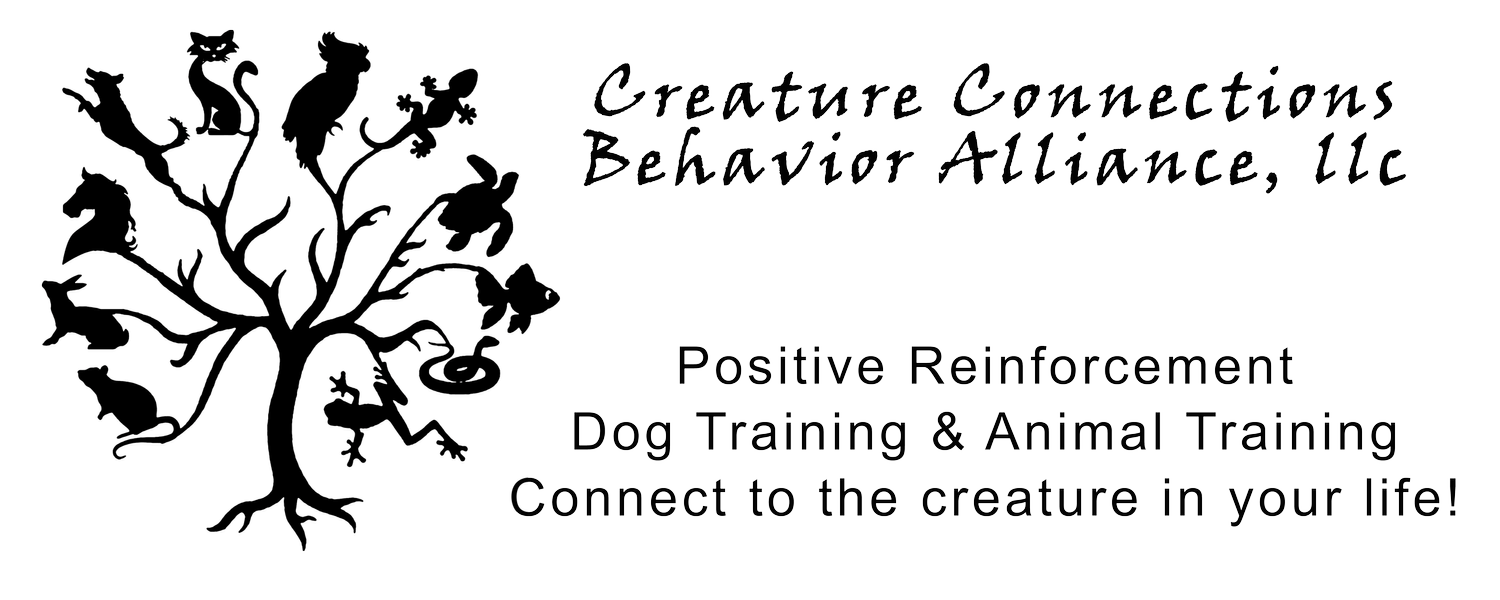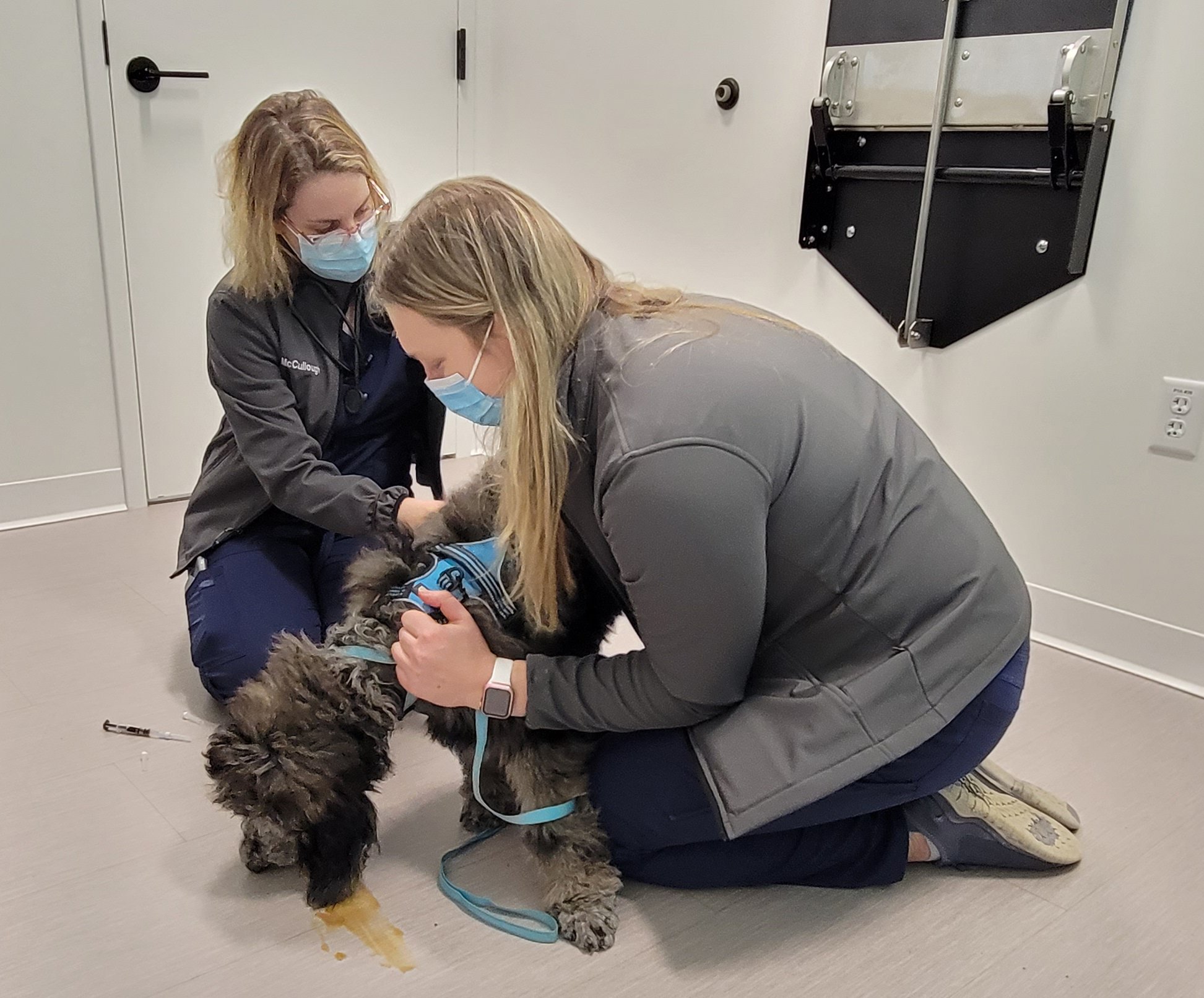
about our Training
We are reinforcement trainers
We offer Coach Style Training for both group classes and private lessons.
we also offer dAY TRAINING in our train and play program.
for definitions OF TRAINING STYLES AND TRAINER TYPES See below
We are not just Dog Trainers, we are People Trainers. We help you understand not only the “HOW TO” but the “WHY” in working with your companion animal.
We utilize the L.I.F.E. (Least Inhibitive, Functionally Effective) and reinforcement to train our humans and animals without the use of fear or forceful type training methods. Which means utilizing the Science of Animal Behavior & Animal Psychology with tools like Applied Behavior Analysis (Operant Conditioning and Classical Conditioning) to find the most valuable resources for the animal and we then utilize different cognitive therapy techniques like shaping, capturing, modeling to create new behaviors and assist in changing problem behaviors in all of our behavior modification.
We educate the caretakers (that’s you) in the Science and Psychology of Behavior and the Proper Skills (“hands on” mechanics of training) to assist the animal in making the correct decisions to fit into our daily lives.
Whether it be basic manners, such as, a puppy learning new skills like sit, down, stay, or correcting problem behaviors, such as, jumping, barking, or leash pulling.
We equip the owner with tools to have fun with the animal while they train together.
Our services are not limited to any one species.
We offer consultations/training
with the following:
Behavior Evaluations
Behavior Modification
Cooperative Care Training for
Grooming and Vet Visits
Animal Training using Force Free Methods
Positive Reinforcement Training
Enrichment Education & Training
Husbandry Evaluations and Education
Nutrition Evaluations and Education
Enclosure Design
Enrichment Play Spaces
Pet Boarding for training clients only
We follow these ethical and respectful statements
AMERICAN VETERINARY MEDICAL ASSOCIATION
https://www.avma.org/
According to the guidelines: “Aversive training has been associated with detrimental effects on the human–animal bond, problem-solving ability, and the physical and behavioral health of the patient. It causes problem behaviors in normal animals and hastens progression of behavioral disorders in distressed animals.”
AMERICAN VETERINARY SOCIETY OF ANIMAL BEHAVIOR
https://avsab.org/resources
/position-statements/
“Based on current scientific evidence, AVSAB recommends that only reward-based training methods are used for all dog training, including the treatment of behavior problems.”
AMERICAN SOCIETY FOR THE PREVENTION OF CRUELTY TO ANIMALS
https://www.aspca.org/about-us/aspca-policy-and-position-statements/position-statement-training-aids-and-methods
”The ASPCA supports training methods that are based on an understanding of how animals learn and incorporate kindness and respect for both the pet and the guardian. Humane training does not inflict unnecessary distress or discomfort on the pet. Humane training makes primary use of lures and rewards such as food, praise, petting and play. In addition to lures and rewards, there are many training tools and types of equipment designed to assist guardians in managing their pets’ behavior at home and in public places. The ASPCA supports the use of methods and equipment that effectively accomplish the training objective with the least amount of stress for the pet. The ASPCA is opposed to any training equipment that causes a pet to experience physical discomfort or undue anxiety.”
OUR MISSION AND POSITION ON ANIMAL TRAINING
ENABLE YOUR PET TO MAKE THE CORRECT CHOICE THOUGH CAPTURES TRAINING
E
N
A
B
L.I.F.E.
E
nrichment & Training
ourish the Mind, Body, Soul
nimal Husbandry
ehavior Modification
Methodology
nclosure Design
C
A
P
T
U
R
E
S
ommunicate effectively
ddress management
lay appropriately
rain with L.I.F.E
nderstand behavior
einforce the good
nrichment of life
ocialize
Understand the 3 types of Trainers and 4 types of training
There are 4 types of Trainers:
“Positive Reinforcement or Force Free Trainers”, like Creature Connections.
We only use Fear Free Methods.
No Aversive Techniques. These types of trainers have a clear understanding of the science of behavior.
We are tested by respected organizations in Behavior, Ethology, Biology and we sign a Code of Ethics similar to a Medical Doctor signing a “Do No Harm” Ethics Code.
Also called: Scientific Trainer, Clicker Trainers, Relationship Trainers“Crossover” Trainers. These types of trainers have found themselves moving away from balanced methods or punishment methods to train. They are beginning to learn better methods to train and are possibly still falling back on punishment based methods of training. Most do not have certifications, or may be in the process of learning to obtain them.
“Balanced” Trainers. What is “Balanced”? These types of trainers use both reinforcement and punishment. They may have a minimal understanding of the science of behavior. Some call themselves Scientific trainers.
These types of trainers use tools such as shock, vibrating, prong, choke, citronella collars, or slip leads. They do also use positive reinforcement, however, it is not their first go to for changing behavior.“Punishment” Trainers. These types of trainers rely heavily on Shock, Vibrating, Prong, Choke, Citronella Collars or Slip Leads. They typically want a quick fix, and have minimal understanding of the science of behavior.
Also known as: Alpha Trainer, Dominance Trainer, Electronic Trainer, Compulsion Trainer.
This type of training uses punishment as the basis for training.
There are 4 types of Training:
“Coach Group Training” - This type of training is where the Trainer coaches you on understanding the animal, shows you what to do, gives you homework, has you practice over a number of days. These types of classes last 4-7 weeks typically meeting 1 hour a week.
Group Classes can have upwards of 15 dogs or more per class. Typical is 4-10 dogs.The benefits with coach group training
· The cheapest cost ranging from $150 - $300
(depending on business).· Your pup gets to socialize/play with other pups
· Your pup gets to practice under multiple levels
of distractionThe problems with coach group training
· The pet parent has to put in the work.
· The dog may struggle during the classes
due to over stimulation, fear, excitement.· The trainer must share the 1 hour class with
multiple clients.“Coach Private Training” This type of training is where the Trainer coaches you on understanding the animal, shows you what to do, gives you homework, has you practice over a number of days. These types of classes last 4-7 weeks typically meeting 1 hour a week. Private training is one on one with client and dog.
The benefits with coach private training
· The cost ranging from $100 - $175 per hour
(depending on business).· You get one on one training per class.
· You can focus on specific behaviors.
Individually tailored per client.· Can take as many classes as you want.
The problems with coach private training
· Can be very expensive when working with
difficult behaviors.· The client must practice what the trainer
suggests, or the animal won’t get better.· The animal won’t get the opportunity to
socialize with other animals. Unless it is
part of the program and scheduled.“Day Training” This type of training, is when the trainer, trains the dog, at a facility or in your home and then transfers the skills to the client
The benefits with Day training
· A professional trains your dog.
· Less effort on behalf of the client.
The problems with Day training
· Can be very expensive. The trainer drives the
amount of visits to train the animal.
Can be upwards of 5 visits per week at an
hourly rate over multiple weeks.· Depending on the behavior to change can
take weeks to months of training.· The client must be consistent with what the
trainer instructs. If the client fails to follow
through, or disrupts the training during or
after the sessions, it could take longer to
train the animal.“Board and Train” This type of training is when the client leaves their dog with the trainer for a period of time. The trainer trains the dog in their facility, and then transfers the skills to the client.
The benefits with Board and Train type training
· A professional trains your dog.
· Less effort on behalf of the client.
The problems with Board and Train type training
· Is the most expensive type of training.
· A high majority of these facilities are
Punishment based trainers. So do your
research before sending your dog to these
facilities.· The trainer drives the amount of visits to train
the animal.
Trainer can also offer standard packages
for all ages of dogs.· Custom board and train will depending on the
behavior that needs to be changed.
This type of training can take weeks to
months of training.· The client must be consistent with what the
trainer instructs.
If the client fails to follow through, or disrupts
the training during or after the sessions,
it could take longer to train the animal.
NOTE:
When we evaluate an animal, we use similar human psychology, behavioral, and cognitive assessments and then create a plan using similar human therapies to create behavior change in the animal.
READ MORE:
Articles written about fear free training versus aversive training.
https://www.k9ofmine.com/how-to-not-train-dog-with-aversives-punishment/
https://www.companionanimalpsychology.com/2018/04/why-dont-more-people-use-positive.html
https://positively.com/victorias-blog/using-aversives/










